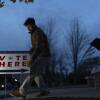I spent the evening of Nov. 5 at a small seafood restaurant in Dorchester called The Pearl. A flawless, rectangular marble bar defined by perfectly chiseled right angles dominates the space. I took a seat, ordered a half dozen oysters and a soda with bitters, and got to work interviewing patrons and writing scripts for the following morning’s radio programming. The assignment was straightforward: report live from an election night watch party attended, largely, by supporters of Vice President Kamala Harris.
And it was, insofar as those individual words mean things, an election night watch party. There was food and drink being consumed in fellowship with other humans on election night, with a large TV on which CNN was broadcasting the returns of the 60th quadrennial United States election.
Striking a single key on a piano doesn’t produce a note that sounds happy or sad or dysfunctional, that association is only formed by the note that follows it. Likewise, words in a phrase don’t operate on their own — they exist in the context of the word before, after, on either side of it. All to say, this was an election party that did not feel like an election party. Yes, the television with CNN did produce sound, but the voices of Dana Bash and Chris Wallace and John King could compete with the music of William DeVaughn and A Taste of Honey and Wale. Bellies weren’t filled by trays of finger foods and cheeses sweating with condensation, but with bowls of pasta and various fruits de mer.
This was a party that just so happened to take place on a night of national import; the TV was there for those who wanted it, but it was a prop on this stage of fellowship and good feelings. The party felt like a reunion, because in a way, it was. Dozens of Howard University alumni filled the space, an apt gathering considering it is the alma mater of the vice president.
It felt like cable news analysis was the side, and the main course was one another a return to the waters of comfort that come with the sight of a familiar face, the news of a professional accomplishment, or recalling tales from those mischievous days of youth.
I stood on the patio with one person as he smoked a cigarette and spoke at length of the marvel that was Black culture in the Western hemisphere. He remarked at how incredible it is that a collection of different sounds and beliefs and practices from the old Africa were transmuted into a new, original, substance alchemized in cauldrons in the dungeons of America’s most villainous lairs. A new culture with its own music and beliefs and fashions and politics and language and cuisine and art and ambition. That was all on display in this 1,300-square foot Dorchester space; a demonstration of a culture that existed before this night, and will certainly persist beyond it, regardless of electoral outcomes.
At around 10:15 p.m., I went on air to discuss the scene with our radio audience. By the time returned to the party, the crowd had begun to thin out, just as the discussion of Wisconsin, Michigan and Pennsylvania began to ramp up in intensity. By 11, it felt like the news of a redux was inevitable.
The next day, I was on the phone with Bianca Sullivan of the Howard University Alumni Club of Greater Boston while Harris delivered her concession speech on the Howard University campus. She remarked on the resiliency of Blackness — the survival in the DNA — but also on the clarity of the mission, to further educate about the quality, excellence, and richness of those historically Black institutions, and to lean into these professional networks to provide community support.
Because Howard wasn’t the only University represented by alumni that night — conversation could be had with graduates of Morehouse, too, and of that great rival Hampton. The brothers and sisters of Divine Nine were also in attendance — Alphas, Deltas, Ques.
That display of unity was what Harris called her beacon of light and the hope to be found in the evening. The work is clear, the culture forever.
Produced with assistance from the Public Media Journalists Association Editor Corps funded by the Corporation for Public Broadcasting , a private corporation funded by the American people.






